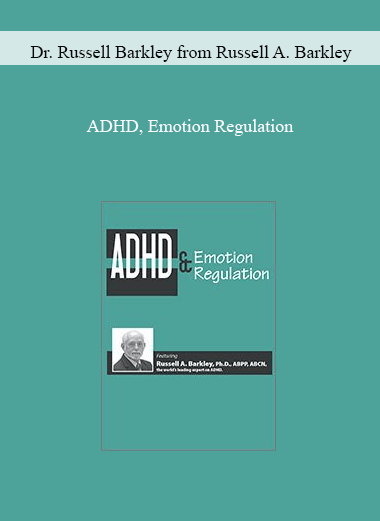Courses Infomation
ADHD, Emotion Regulation with Dr. Russell Barkley from Russell A. Barkley

ADHD, Emotion Regulation with Dr. Russell Barkley from Russell A. Barkley
Faculty:Russell A. Barkley
Duration:1 Hour 17 Minutes | Format:Audio and Video
Archive : ADHD, Emotion Regulation with Dr. Russell Barkley from Russell A. Barkley
Outline:
- Current Clinical View of ADHD (excludes emotion)
- Defining Emotion and Emotional Self-Regulation
- Overview of 7 Arguments for Including Emotional Dysregulation in ADHD
- History of ADHD Includes Emotion until 1968
- Neuroanatomy of ADHD Includes Emotion Regulation Structures
- Neuropsychology of ADHD Includes Emotion Regulation Networks
- Psychological Evidence Shows Impulsive Emotion and Poor Self-Regulation in ADHD
- Emotional Dysregulation Predicts Life Risks Not Predicted by ADHD Traditional Symptoms
- Including Emotion Permits Deeper Understanding of Comorbidity in ADHD
- Implications of Emotional Dysregulation for Diagnosis of ADHD
- Implications of Emotional Dysregulation for Management of ADHD
Description:
Returning emotion to its rightful place as a core feature of ADHD serves to better explain the development of comorbid disorders, such as oppositional defiant disorder, as well as various life course impairments. Dr. Barkley will show you how to determine which aspects of emotional adjustment problems in ADHD cases are the result of the disorder, and which are likely to be the consequence of comorbidity or other life course circumstances. He will also address the implications of including emotion in ADHD for its management.
Salepage : ADHD, Emotion Regulation with Dr. Russell Barkley from Russell A. Barkley
About Author
Russell A. Barkley
Dr. Barkley retired as a Professor of Psychiatry and Neurology from the University of Massachusetts Medical Center (1985-2002) and subsequently worked as a Professor of Psychiatry and Health Sciences at the Medical University of South Carolina (2003-2016). He is currently Clinical Professor of Psychiatry at Virginia Commonwealth University Medical Center (2016-present). After serving in the United States Air Force from 1968 to 1972, including a tour of duty in Vietnam, he obtained his Bachelor’s Degree with Honors from the University of North Carolina in 1973. He received his Masters Degree in 1975 and his Ph.D. in 1977 with Honors in Clinical Psychology from Bowling Green State University in Ohio. He then attended the Oregon Health Sciences University for internship training in developmental, learning, and behavioral disorders of children. Thereafter, he joined the Department of Neurology at the Medical College of Wisconsin and Milwaukee Children’s Hospital where he founded the Neuropsychology Service and served as its Chief until 1985. He then moved to the University of Massachusetts Medical School (1985-2002), where he served as the Director of Psychology for more than 15 years and established the research clinics for both child and adult Attention Deficit Hyperactivity Disorders. In 2003, he became a Clinical Professor of Psychiatry with the Medical University of South Carolina, where he remained until 2017 when he relocated to VCU in Richmond, VA.
Dr. Barkley is a Diplomate (board certified) in three specialties, Clinical Psychology (ABPP), Clinical Child and Adolescent Psychology, and Clinical Neuropsychology (ABCN, ABPP). He is also a Fellow in the American Psychological Association. A clinical scientist, educator, and practitioner, he has published 25 books, rating scales, and clinical manuals now numbering 43 separate editions. He has also published more than 300 scientific articles and book chapters on ADHD and related disorders. He founded The ADHD Report (Guilford), a clinical newsletter in its 28th year and on which he serves as Editor. He has created seven award winning professional videos on ADHD and defiant children. Dr. Barkley has served on the editorial boards of and as a reviewer for numerous scientific journals. He was the President of the Section of Clinical Child Psychology, Division 12, of the American Psychological Association (1988)[now Division 53], and was President of the International Society for Research in Child and Adolescent Psychopathology (1991).































Reviews
There are no reviews yet.